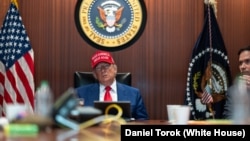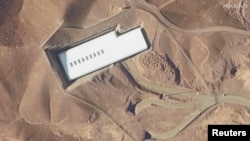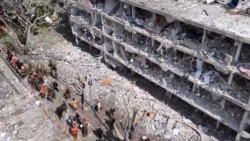Loud explosions rocked parts of Tehran after US President Donald Trump suggested he might welcome the toppling of the government in Iran despite members of his administration insisting that recent attacks on the country were not intended to bring about “regime change."
The Israeli Air Force said it was striking targets in Tehran on June 23 with witnesses reporting loud explosions.
The Israeli air force said in a statement it had begun "a series of strikes toward military targets in Tehran." It did not elaborate and the extent of the damage from the attacks was not immediately clear.
Meanwhile Iranian state television said the underground nuclear facility at Fordow, one of the focuses of weekend attacks by the United States, was hit again. Israeli media, quoting unnamed sources, said the attacks were on roads leading to the complex, and not directly on the facility itself.
Iran also launched a new round of air strikes targeting Israel in the early morning hours of June 23.
Earlier in the day, Trump said "monumental damage" had been inflicted on Iran's main nuclear facilities, adding that "obliteration is an accurate term" to be used to describe the effects of US bombing of the sites.
“It’s not politically correct to use the term, “Regime Change,” but if the current Iranian Regime is unable to MAKE IRAN GREAT AGAIN, why wouldn’t there be a Regime change??? MIGA!!!” Trump also wrote on his Truth Social platform.
The International Atomic Energy Agency (IAEA) said on June 23 the US bombing likely resulted in "very significant" damage to the Fordow uranium enrichment plant, which is dug into a mountain in central Iran.
IAEA Says Fordow Damage Likely "Very Significant"
"Given the explosive payload utilized and the extreme(ly) vibration-sensitive nature of centrifuges, very significant damage is expected to have occurred," IAEA chief Rafael Grossi said in a statement at an emergency meeting of the UN nuclear watchdog's 35-nation board of governors.
Trump's comments came hours after leading members of his administration -- Vice President JD Vance, Secretary of State Marco Rubio, and Defense Secretary Pete Hegseth -- indicated a negotiated settlement was the goal of the June 21 US air strikes on Iranian nuclear sites and not the toppling of the current Islamic-led theocratic government.
At a news conference, Hegseth called the strikes a "precision operation" aimed only at Iran's nuclear program, not Iranian troops or the Iranian people. "This mission was not, and has not been, about regime game," he said.
Trump "seeks peace, and Iran should take that path," Hegseth said, later adding: "There needs to be a negotiated settlement here."
Some members of Trump's Republican Party have, however, in the past called for the toppling of the Iranian government, including influential Texas Senator Ted Cruz.
“I am advocating that we use maximum pressure and economic sanctions to pressure the regime in a way that might encourage this regime to fall,” he said before the US strikes.
US officials on June 22 warned Tehran not to retaliate after the unprecedented air strikes.
Amid the rising tensions, the United States issued a rare "worldwide caution," advising US overseas to exercise increased caution.
"The conflict between Israel and Iran has resulted in disruptions to travel and periodic closure of airspace across the Middle East. There is the potential for demonstrations against US citizens and interests abroad," advisory stated.
Iran turned a cold shoulder to urgent calls from for a return to negotiations, stressing its right to self-defense, saying the United States would be responsible for the "dangerous consequences" of its actions, and suggesting that diplomacy can only come after Tehran responds.
Foreign Minister Abbas Araqchi told a news conference in Istanbul that “door to diplomacy” should always be open but that "this is not the case right now."
Iran is under attack and will exercise its right to self-defense for as long as is necessary, he added, but said he could not reveal what actions Iran would take in response to the US strikes.
Araqchi arrived in Moscow to hold consultations on June 23 with senior leaders, including President Vladimir Putin, whose recent offer to help mediate negotiations with Tehran was effectively rejected by Trump.
"Russia is our partner and we always consult," Araqchi said prior to his arrival.
Meanwhile, Israeli Prime Minister Bejamin Netanyahu said Israel is "very, very close" to reaching its goals of after more than a week of air strikes on Iran, including elimination of Tehran's ballistic missile and nuclear threats.
"We are moving step by step toward achieving these goals, we are very, very close to completing them," Netanyahu told a news conference.
He added that "when they have been reached, the operation will finish."
Israel launched large-scale attacks on Iran on June 13 targeting its missile and nuclear facilities, as well as military leaders and security services.
Many leading military figures and nuclear scientists have been killed in the assaults, Iran has acknowledged.
Since the launching of the initial Israeli strikes, both nations have been exchanging air assaults on each other, causing military and civilian deaths and property damages.
The Washington-based group Human Rights Activists said at least 950 people have been killed in Iran during the air strikes since June 13, including 380 civilians. Israeli authorities put the death toll from Iranian strikes at 24.
The UN chief cautioned of a "growing risk that this conflict could rapidly get out of control" as fears of a wider war grew following the US bombings overnight.
Antonio Guterres was speaking at an emergency session of the UN Security Council, adding that "the people of the region cannot endure another cycle of destruction.
Russia, China, and Pakistan proposed that the 15-member body adopt a resolution calling for an unconditional cease-fire in the Middle East, but it was not clear if it would be put to a vote.
Trump, who just two days ago had said he would decide "within two weeks" whether to join Israel in its effort to destroy Iranian nuclear sites, said that "Iran, the bully of the Middle East, must now make peace."
"If they do not, future attacks will be far greater and a lot easier," Trump said. adding that Iran's future holds "either peace or tragedy."
There were no immediate reports of any Iranian strikes targeting US interests in the Middle East or elsewhere, but Iran's Islamic Revolutionary Guards Corps (IRGC) said it had launched 40 missiles targeting Israel on the morning of June 22, including one of Tehran's biggest ballistic missiles, the Khorramshahr-4.
British Prime Minister Keir Starmer, who had joined the European Union, France, and Germany last week in seeking to find a diplomatic solution in talks with Iran, urged Tehran to return to negotiations.
“Iran can never be allowed to develop a nuclear weapon and the U.S. has taken action to alleviate that threat," Starmer said.
European Commission President Ursula von der Leyen also said that "Iran must never acquire the bomb."
The Russian Foreign Ministry said Moscow "strongly condemns" the US bombings, which it said were "irresponsible" and a "gross violation of international law."














